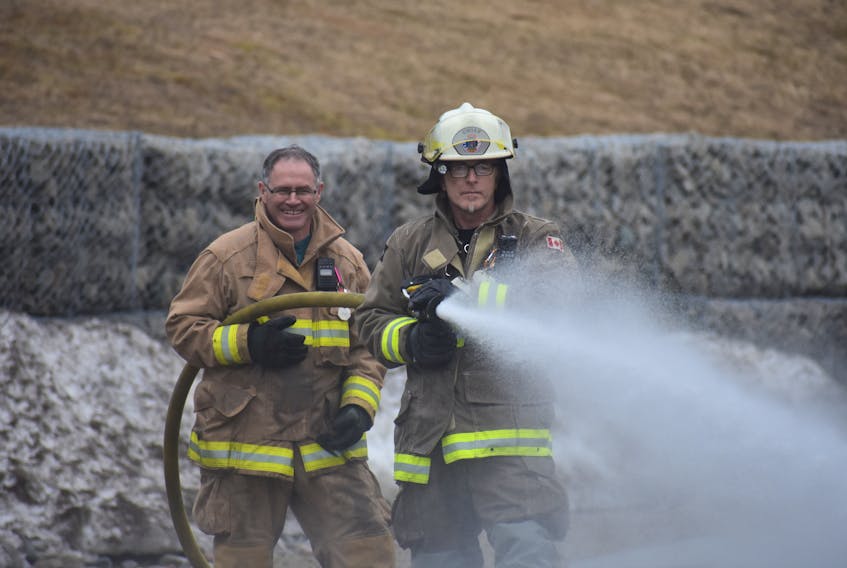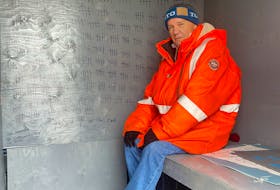Lorne Head fell into volunteer firefighting almost by accident.
In February 2010, a fire ripped through the fire hall in Baie Verte and destroyed all that was inside, including the department’s two pumper trucks.
The department got a replacement vehicle from the west coast, but there was a problem.
No one in the department had air brake qualifications and there wasn’t anyone to drive the vehicle.
That’s where Head comes in. An employee with the Newfoundland and Labrador English School District, he could operate a vehicle with air brakes, and he agreed to temporarily come onboard.
Head has now spent 11 years on the fire department in Baie Verte, the last six of which have been as the town’s fire chief.
Lately, he’s been thinking about the future of firefighting in the region and the challenges he faces.
One of those is numbers. His department is getting older, and in the last year the department has lost members as they moved away.
Right now, the Baie Verte department is down to 21 members. With work commitments, there are 10 to 12 firefighters available for fire calls during the workday.
“It is a nervous few minutes to see who is going to respond to the call,” said Head.
The challenges facing rural firefighting and how to best navigate those hindrances will be the subject of an upcoming research project being done through a collaboration between the Marine Institute and the province’s fire commissioner's office.
It is being funded by a $54,500 grant from the International Grenfell Association, along with contributions from both the Insurance Bureau of Canada and Newfoundland and Labrador Hydro. Both of those contributions are $10,000 each.
The two-year project will examine firefighting strategies and equipment used in volunteer firefighting departments, with an eye on declining populations.
At the end there will be recommendations forwarded to departments on how they could best deal with issues through new firefighting methods and limiting risk to the community.
“Our role is to gather the information,” said Elizabeth Sanli, a researcher with the Marine Institute’s ocean safety research unit and the project lead. “We’re looking for helpful strategies and helpful tools.”
The project will be broken down into three phases, the first of which will have researchers delving into the subject through journal articles, previous research done by firefighting organizations and other documents relevant to what they’re looking to address.
They will focus on literature that focuses on challenges faced by other coastal and northern regions with dwindling firefighter numbers.
“We want to make (fire departments) effective and as efficient as possible,” said Sanli.
From there, in the second phase, the group will formulate the strategies and equipment they’ve identified in the first phase. This could include examining things such as how the number of firefighters and the weather may effect each strategy.
The results of the research will be published, and recommendations will be made to communities in the final phase of the project.
One strategy Head believes will work is a focus on the regionalization of fire departments to maximize the number of firefighters in any particular region.
It also maximizes the equipment necessary and allows the different departments to pursue other complementary goals.
Many departments already pledge to help out neighbouring ones, but Head’s idea could mean stronger numbers for a singular department.
“I think one of the reasons regional fire departments have to start working is that you have to be able to draw from other towns,” said Head. “Other towns helping us and we’re helping other towns.”
Guy Oakley, the fire chief with the New-Wes-Valley Volunteer Fire Department, had an idea that could work with any form of regionalization.
He says the province could look at forming a paid regional fire chief position in areas that take on regionalization.
Oakley’s department already works well with other fire departments in Bonavista North, he says, but such a position may help with the organization of that work.
“I could see that working and making things better that way,” said Oakley.
Justice and Public Safety Minister Steve Crocker said he is looking forward to seeing the results of the project.
A former firefighter in Heart’s Delight-Islington, he was one of the younger members then and knows how some departments struggle with their aging members.
He says the research project will prove valuable in providing a roadmap for how the province helps fire departments through any future challenges.
“It’s a strategy,” said Crocker. “It is, how do we provide safety to people in the future.”
Nicholas Mercer is a Local Journalism Initiative reporter covering central Newfoundland for SaltWire Network.









